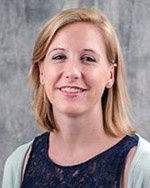Community health workers key to rural oral health
 Gabriela Boscan  Katharine Miller Nimmons |
Waiting more than a year for dental care is a harsh reality for many rural residents, and lists for some dental clinics have hundreds — if not thousands — of names on them. A big part of the problem is access: nearly 65 percent of the country’s dental health professional shortage areas are located in rural areas, and rural residents are 10 percent less likely to have seen a dentist in the last year than their urban counterparts.
Improving access to oral health services is a critical need in rural America, and community health workers (CHWs) are a key part of the solution. CHWs live and work in the communities they serve, which makes them uniquely positioned to build relationships with underserved rural and frontier populations. They have the credibility and trust needed to help overcome barriers to primary care and oral health services.
Dental care disparities
“Research and experience show that rural residents experience many disparities in oral health and outcomes,” says Katharine Miller Nimmons, MPH, MSc, Texas A&M College of Dentistry Department of Public Health Sciences manager of research projects administration. “Unfortunately, the barriers that exist in primary care — provider shortages, geography, transportation, health insurance, language barriers, cultural issues, and more — are compounded when it comes to oral health.”
Dental care providers are fewer and farther between, and people in rural areas often don’t have dental insurance. Even if rural residents do have some form of health insurance, many don’t have dental coverage unless it’s offered by an employer. “Connecting rural Texans who currently lack access to dental health is an important step to improving overall wellness across the state,” Nimmons says.
Partnerships promote CHW training
NRHA began to lay the foundation for a National Rural Community Health Worker Training Network in 2011 to provide instruction to CHWs along rural areas of the U.S.- Mexico border. Since then, NRHA has expanded the initial partnership with other private and public collaborators including the Community Anti-Drug Coalitions of America, the DentaQuest Foundation, the Livestrong Foundation, the National Eye Institute, the Office of Minority Health, the U.S.-Mexico Border Health Commission, the Appalachian Regional Commission, the Centers for Medicare & Medicaid Services, and state offices of border health.
“More than 1,000 health workers in Texas and Georgia have been trained in topics ranging from obesity and diabetes to cancer survivorship and opioid abuse — and now oral health as well,” says Gabriela Boscan, MPH, NRHA program services and development director.
Smiles for Life curriculum
With funding from the DentaQuest Foundation, NRHA worked with Texas A&M Community Health Worker Training Center and the Smiles for Life program to develop a new CHW oral health curriculum. Texas A&M University also collaborated with the University of Texas Rio Grande Valley and South Texas College on the development and rollout of the curriculum in Texas.
“The Smiles for Life curriculum was originally developed to train medical professionals about risk factors related to oral health,” Nimmons explains. “We adapted the curriculum to be more broad based, community focused, and relevant for CHWs, as well as responsive to cultural issues in Texas border communities.”
“The goal is to elevate oral health issues by providing training to community health workers so they can identify concerns and help patients find the services they need,” Nimmons adds. “The curriculum focuses on the importance of oral health in life stages, children, pregnant women, and older adults.”
The program involves eight hours of training in an interactive format on general oral health and special considerations for at-risk populations. The first CHW oral health training session using the Smiles for Life curriculum was held in February 2017 in Texas.
NRHA hosted an Oral Health Community Health Worker training this past February with 55 participants, including CHWs and providers from across Texas and New Mexico. The DentaQuest Foundation provided support, in partnership with the Texas Department of State Health Services Office of Border Public Health, the New Mexico Office of Border Health, and the Texas A&M Community Health Worker Training Center.
CHW model for outreach
The CHW model works by training front-line health workers to inform people in rural communities about the importance of oral health and empower them to find dental providers and services. “We’ve found that people are more likely to act on the resources and referrals of someone they know and trust,” Nimmons says.
CHWs understand what matters to residents in their communities and communicate in a language they understand. CHWs also recognize important cultural issues and help patients feel comfortable making decisions about their health and family. “Providing information in a familiar language and in a way that is easily understood by the patient makes a difference,” Boscan adds.
Sometimes people have questions about the costs and whether they’ll need to show immigration status when they go to a dentist. “CHWs can address the fears they may be having and promote access to care,” Nimmons says.
Reimbursement matters
As health care reimbursement models evolve, community health workers are expected to have an increasingly important role. “By proving how much they can improve health outcomes and cost savings, we hope CHWs will be reimbursed as part of the health care system. We want to make sure CHWs are recognized and compensated for improving outcomes and providing cost savings in both primary and oral health care,” Boscan says.
NRHA encourages members to contribute to the conversation on NRHA Connect (connect.nrharural.org) by sharing success stories and highlighting the ways CHWs are an integral part of the health care system.
Image © iStock.com / PIKSEL
